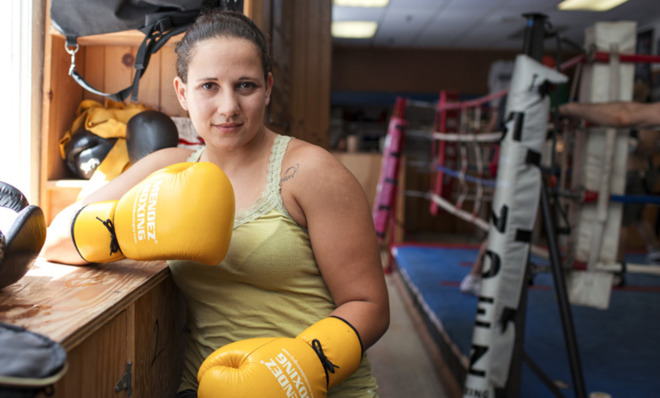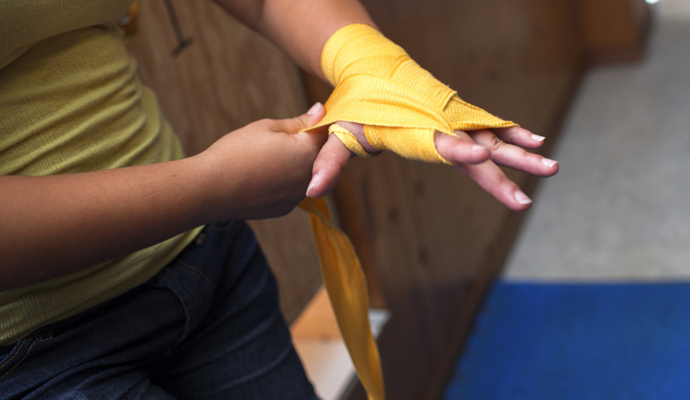The life of a female boxer
Knowing full well the world of women's boxing offers little in the way of glory, fame or riches, one quick-footed Italian immigrant determines to conquer it anyway

A free daily email with the biggest news stories of the day – and the best features from TheWeek.com
You are now subscribed
Your newsletter sign-up was successful

Susanna Mellone-Spence won her first fight when she was only three. When a boy in her pre-school in northern Italy tried to take her lunch, Susanna slammed his head against a locker. She was expelled. While some parents might have been ashamed of such violent behavior, Susanna, in her imperfect English, says her mother was proud. "I mean not to broke his head, but he was stealing my lunch!" she says with a laugh.
Some 20 years later, on the morning of April 8, 2011, Mellone-Spence and her coach, Francisco Mendez, a short, stocky man with sad, dark eyes and jowly cheeks, leaned against a bare white wall in the basement of the Daily News headquarters on West 33rd Street in Manhattan. They wore matching green sweatshirts that read "MENDEZ BOXING." In less than 12 hours and only a few blocks away, Mellone-Spence would compete in the Daily News Golden Gloves Championships at Madison Square Garden.
To ensure her fight in a 112-lb. weight class, Mellone-Spence hadn't eaten anything since the previous afternoon. She rubbed her stomach underneath her sweatshirt and sighed. "They late," she said, referring to the officials keeping her from breakfast. Under the basement's fluorescent light, she looked pale. Her dark eyes, usually animated and warm, appeared serious. A mess of brown curls held in check by a few baby barrettes, combined with the slight gap between her front teeth, made her appear younger than her 26 years.
The Week
Escape your echo chamber. Get the facts behind the news, plus analysis from multiple perspectives.

Sign up for The Week's Free Newsletters
From our morning news briefing to a weekly Good News Newsletter, get the best of The Week delivered directly to your inbox.
From our morning news briefing to a weekly Good News Newsletter, get the best of The Week delivered directly to your inbox.
At 5'1, and exactly 112 lbs., Mellone-Spence did not cut an imposing figure. Though T-shirts fit snugly around her upper arms and shoulders, people are usually surprised to hear she boxes. That puzzled reaction is commonly encountered by women boxers. Although they recently returned to the Olympics after a century-long absence, even those deeply invested in the sport admit to discomfort at seeing women in the ring. "If I had to choose between allowing women to box and not, I'd go with not," says Brian Adams, a former boxer and the director of the Golden Gloves Tournament. "At the end of the day, you still don't want to see your daughter with a black eye or a bloody nose, whereas it's appreciated if it's a boy."
(More from Narratively: Zen and the art of whip cracking)
That night in April, Mellone-Spence, a natural-born fighter and karate champion in her native Italy who discovered boxing late, in her twenties, was preparing to fight Christina Cruz, 28, a four-time Golden Gloves champ whose fans were expecting a fifth win. In 2011, Cruz had 60 fights, compared to Mellone-Spence's five. In spite of her gangly arms and stick legs, she was one of the top-ranked female boxers in the country, and widely seen as a 2012 Olympic contender.
Cruz stepped out of the News building's elevator wearing skinny jeans and boots. She had lost seven pounds to make herself eligible for the Olympics' flyweight class. Her hair, parted down the middle, created a dark sleek curtain for her long face and prominent nose, which she broke only two years earlier.
A free daily email with the biggest news stories of the day – and the best features from TheWeek.com
Cruz, who's a head taller than Mellone-Spence, kept a professional distance but was not unfriendly. One of Mellone-Spence's teammates, Nisa Rodriguez, a tall, pretty girl with a faint birthmark by her left temple, tried to engage both girls in small talk but after a few minutes Mellone-Spence wandered off, still rubbing her stomach.
As officials distributed mouth guards, complimentary tickets and the tournament's official program to each fighter, male boxers in the room tore off sweatpants and T-shirts. They stood in their boxer shorts, sucking in stomachs and puffing out tattooed chests. The newer fighters furtively counted the number of Golden Glove charms dangling from veterans' necks. The women fighters filed into the back room for their weigh-in.
Cassie Rodriguez, a tall, broad-shouldered USA Boxing official with thinly arched eyebrows, stood by the scale holding a clipboard. She called Christella Cepeda, a baby-faced Dominican girl whose wide eyes betrayed her nerves, towards her. "Hey beautiful, step on that scale for me." She motioned toward the old-fashioned scale — the kind usually found in hospitals and locker rooms. Cepeda, wearing only a bra and panties, walked forward quietly. "Any jewelry?" asked Rodriguez. Cepeda shook her head.
(More from Narratively: The contender)
The boxers sat in chairs and on table edges. Some stripped down to their underwear. Others hid behind hooded sweatshirts and oversized headphones until their turns were called. Mellone-Spence found a spot near the scale and without any hesitation, whisked off all her clothes, revealing a tattoo just below her armpit, the same tribal design as Mike Tyson's, and waited her turn. After a few minutes, she stepped up onto the scale. Rodriguez marked her clipboard and smiled. Mellone-Spence had made weight.

In the first round at the fight that night, Mellone-Spence was the aggressor, while Cruz threw few punches and ran. The pressure from Mellone-Spence surprised the MSG Network's announcers. "Spence does not look intimidated at all," said Kathy Clancy Burke, daughter of the late famed boxing trainer Gil Clancy. "If she can do this for four rounds, she'll steal this bout," her partner Michael Crispino echoed.
Cruz seemed not to hear the advice shouted by fans to "throw something!" Instead, she kept weaving and bouncing to one side or the other, letting Mellone-Spence do most of the punching. Some boxing critics would later say Cruz took it easy for the first round in order to gauge Mellone-Spence's strikes and plan her strategy.
As she began to throw more than just counter-punches at the end of the first round and into the second, the announcers shifted their attention to Cruz — her record, her conditioning, her discipline and her Olympic potential. "Of all of our female boxers, Cruz has always reminded me the most of a man in the ring," said announcer Clancy Burke. The commentators called Mellone-Spence "courageous" and "dangerous." "Spence has a lot of guts. She's come forward the entire bout," said Clancy Burke. By the final round it was clear Mellone-Spence was outmatched, but she refused to give up. "She's still throwing punches. Look at that uppercut!" marveled announcer John Duddy.
After the final bell, after the drowsy hugs and handshakes, and after the scores had been tallied, both women returned to the ring's center. The referee stood between them, one wrist in each of his meaty hands. A moment later the announcer gave comment and the referee raised Cruz's left arm in the air. The two boxers hugged once more. Mellone-Spence's mouth folded in on itself and she blinked quickly several times before she could get out of the way of the camera.
The following morning Mellone-Spence returned to her job at the reception desk of Mendez Boxing on West 28th Street. Sitting beside a glass case full of framed portraits, boxing gloves and colored wraps, she smiled with some effort when members congratulated her efforts or badmouthed Cruz.
(More from Narratively: 'What's a girl doing here?')
While she admitted that Cruz did ultimately win more points, Mellone-Spence didn't think this diminished her standing. In an amateur fight, such as the Golden Gloves Tournament, an individual scores points with "clean punches" — ones that haven't been deflected by a boxer's mitt, arm or any part of the ring, and that connect with the front of the head or torso and land above the belt. Had it been a professional fight, punches to the sides and stomach, known as body shots, would have counted. "I think the most solid punches were from my part. As a pro, I won the fight. I think as an amateur, I lose the fight," Mellone-Spence said.
Mellone-Spence said her style — fighting inside instead of wide, and pummeling her opponents with body shots — is best suited to professional fights, where the headgear is left in the sparring ring, and power wins. Her ultimate goal for the last three years has been to make it as a pro; she surprised reporters at the weigh-in by telling them she had no Olympic dreams. Olympic boxing is an amateur sport, endorsing amateur rules. For her, the Golden Gloves Tournament was a springboard for a paid, professional career.
Becoming a pro boxer requires tremendous dedication and hope — some would say a willing suspension of disbelief. "Physically and mentally it's the toughest sport there is," says Noriko Kariya, a former professional female boxer. "It's a sport that doesn't give back to the individual. It just takes." A top tier male boxer can make $20,000 to $30,000 per fight, but female boxers, with the exception of superstar scions Laila Ali and Jacqui Frazier-Lyde, make considerably less — as little as $500 for a four-round fight. Boxing promoters argue that women are paid less because their bouts are harder to sell to the predominantly male audience. Kariya put it this way: "Men don't want to see an ugly girl fight and they don't want to see a pretty girl get hurt."
Read the rest of this story at Narratively.
Narratively is an online magazine devoted to original, in-depth and untold stories. Each week, Narratively explores a different theme and publishes just one story a day. It was one of TIME's 50 Best Websites of 2013.
-
 How the FCC’s ‘equal time’ rule works
How the FCC’s ‘equal time’ rule worksIn the Spotlight The law is at the heart of the Colbert-CBS conflict
-
 What is the endgame in the DHS shutdown?
What is the endgame in the DHS shutdown?Today’s Big Question Democrats want to rein in ICE’s immigration crackdown
-
 ‘Poor time management isn’t just an inconvenience’
‘Poor time management isn’t just an inconvenience’Instant Opinion Opinion, comment and editorials of the day